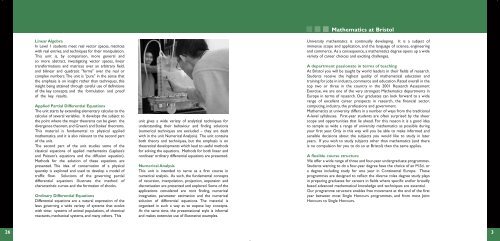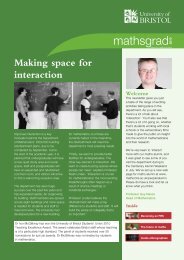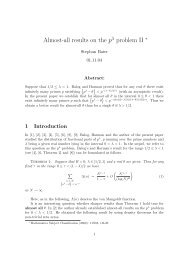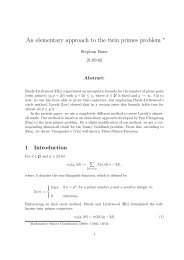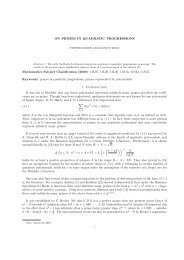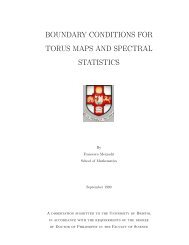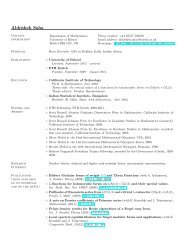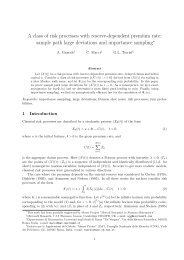MATHEMATICS AT BRISTOL - University of Bristol
MATHEMATICS AT BRISTOL - University of Bristol
MATHEMATICS AT BRISTOL - University of Bristol
You also want an ePaper? Increase the reach of your titles
YUMPU automatically turns print PDFs into web optimized ePapers that Google loves.
Linear Algebra<br />
In Level 1 students meet real vector spaces, matrices<br />
with real entries, and techniques for their manipulation.<br />
This unit is, by comparison, more general and<br />
so more abstract, investigating vector spaces, linear<br />
transformations and matrices over an arbitrary field,<br />
and bilinear and quadratic "forms" over the real or<br />
complex numbers. The unit is "pure" in the sense that<br />
the emphasis is on insight rather than techniques, this<br />
insight being attained through careful use <strong>of</strong> definitions<br />
<strong>of</strong> the key concepts, and the formulation and pro<strong>of</strong><br />
<strong>of</strong> the key results.<br />
Applied Partial Differential Equations<br />
The unit starts by extending elementary calculus to the<br />
calculus <strong>of</strong> several variables. It develops the subject to<br />
the point where the major theorems can be given: the<br />
divergence theorem, and Green’s and Stokes’ theorems.<br />
This material is fundamental to physical applied<br />
mathematics, and it is also relevant to the second part<br />
<strong>of</strong> the unit.<br />
The second part <strong>of</strong> the unit studies some <strong>of</strong> the<br />
classical equations <strong>of</strong> applied mathematics (Laplace’s<br />
and Poisson’s equations and the diffusion equation).<br />
Methods for the solution <strong>of</strong> these equations are<br />
presented. The idea <strong>of</strong> conservation <strong>of</strong> a physical<br />
quantity is explored and used to develop a model <strong>of</strong><br />
traffic flow. Solutions <strong>of</strong> the governing partial<br />
differential equations illustrate the method <strong>of</strong><br />
characteristic curves and the formation <strong>of</strong> shocks.<br />
Ordinary Differential Equations<br />
Differential equations are a natural expression <strong>of</strong> the<br />
laws governing a wide variety <strong>of</strong> systems that evolve<br />
with time: systems <strong>of</strong> animal populations, <strong>of</strong> chemical<br />
reactants, mechanical systems, and many others. This<br />
unit gives a wide variety <strong>of</strong> analytical techniques for<br />
understanding their behaviour and finding solutions<br />
(numerical techniques are excluded – they are dealt<br />
with in the unit Numerical Analysis). The unit contains<br />
both theory and techniques, but the emphasis is on<br />
theoretical developments which lead to useful methods<br />
for solving the equations. Methods for both linear and<br />
nonlinear ordinary differential equations are presented.<br />
Numerical Analysis<br />
This unit is intended to serve as a first course in<br />
numerical analysis. As such, the fundamental concepts<br />
<strong>of</strong> recursion, interpolation, projection, expansion and<br />
discretisation are presented and explored. Some <strong>of</strong> the<br />
applications considered are root finding, numerical<br />
integration, parameter estimation and the numerical<br />
solution <strong>of</strong> differential equations. The material is<br />
organised in such a way as to expose key concepts.<br />
At the same time, the presentational style is informal<br />
and makes extensive use <strong>of</strong> illustrative examples.<br />
Mathematics at <strong>Bristol</strong><br />
<strong>University</strong> mathematics is continually developing. It is a subject <strong>of</strong><br />
immense scope and application, and the language <strong>of</strong> science, engineering<br />
and commerce. As a consequence, a mathematics degree opens up a wide<br />
variety <strong>of</strong> career choices and exciting challenges.<br />
A department passionate in terms <strong>of</strong> teaching<br />
At <strong>Bristol</strong> you will be taught by world leaders in their fields <strong>of</strong> research.<br />
Students receive the highest quality <strong>of</strong> mathematical education and<br />
training for jobs in industry, commerce and education. Rated overall in the<br />
top two or three in the country in the 2001 Research Assessment<br />
Exercise, we are one <strong>of</strong> the very strongest Mathematics departments in<br />
Europe in terms <strong>of</strong> research. Our graduates can look forward to a wide<br />
range <strong>of</strong> excellent career prospects in research, the financial sector,<br />
computing, industry, the pr<strong>of</strong>essions and government.<br />
Mathematics at university differs in a number <strong>of</strong> ways from the traditional<br />
A-level syllabuses. First-year students are <strong>of</strong>ten surprised by the sheer<br />
scope and opportunities that lie ahead. For this reason it is a good idea<br />
to sample as wide a range <strong>of</strong> university mathematics as possible during<br />
your first year. Only in this way will you be able to make informed and<br />
sensible decisions about the subjects you would like to study in later<br />
years. If you wish to study subjects other than mathematics (and there<br />
is no compulsion for you to do so at <strong>Bristol</strong>) then the same applies.<br />
A flexible course structure<br />
We <strong>of</strong>fer a wide range <strong>of</strong> three and four-year undergraduate programmes.<br />
Students wanting to do a four-year degree have the choice <strong>of</strong> an M.Sci. or<br />
a degree including study for one year in Continental Europe. These<br />
programmes are designed to reflect the diverse roles degree study plays<br />
in preparing graduates for careers in fields where specific and/or broadly<br />
based advanced mathematical knowledge and techniques are essential.<br />
Our programme structure enables free movement at the end <strong>of</strong> the first<br />
year between most Single Honours programmes, and from most Joint<br />
Honours to Single Honours.<br />
26<br />
3


